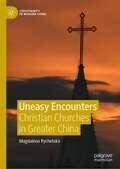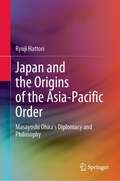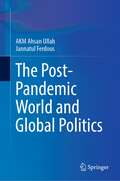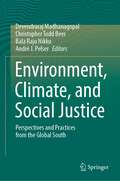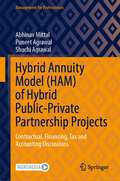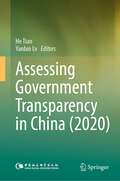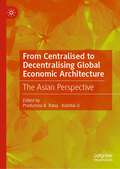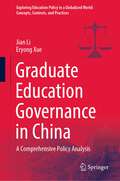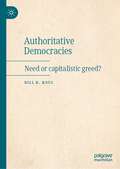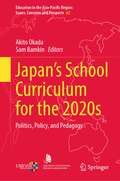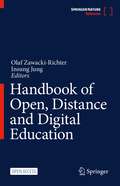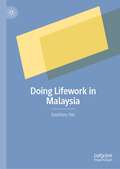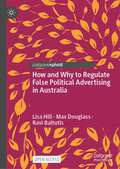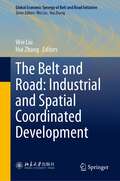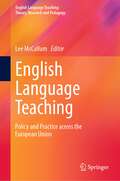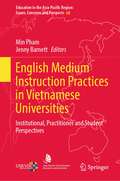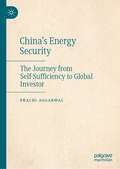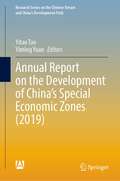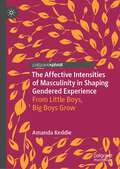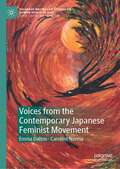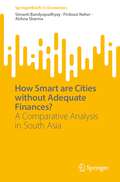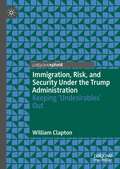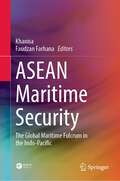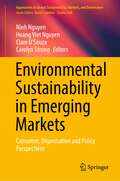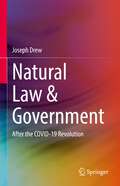- Table View
- List View
Uneasy Encounters: Christian Churches in Greater China (Christianity in Modern China)
by Magdaléna RychetskáThe book examines the dynamic processes of the various social, political, and cultural negotiations that representatives of Christian groups engage in within authoritarian societies in Greater China, where Christianity is deemed a foreign religious system brought to China by colonial rulers. The book explores the political and social cooperation and negotiations of two particular Christian groups in their respective and distinct settings: the open sector of the Catholic Church in the communist People’s Republic on mainland China from 1945 to the present day, and the Presbyterian church of Taiwan in the Republic of China in Taiwan during the period of martial law from 1949 to 1987. Rather than simply confirm the ‘domination-resistance’ model of church–state relations, the book focuses on the various approaches adopted by religious groups during the process of negotiation. In an authoritative Chinese environment, religious specialists face two related pressures: the demands of their authoritarian rulers and social pressure requiring them to assimilate to the local culture. The book uses two case studies to support a wider theory of economic approach to religion.
Japan and the Origins of the Asia-Pacific Order: Masayoshi Ohira's Diplomacy and Philosophy
by Ryuji HattoriThis book analyzes Ohira's ideology, philosophy, and actions as a politician and a minister, based on primary sources from Japan and the USA, and makes a significant contribution to the field of Japanese political and diplomatic history. This book is the first critical biography to chart Masayoshi Ohira’s life and work, with a focus on his political philosophy, and how he sought to create a new order in the Asia-Pacific region, framing a plan for solidarity across the Pacific Rim. If a statesman is a politician who has made diplomacy their life's work, then Ohira can be regarded as the first Japanese statesman of the modern era. While this ambition remained unfulfilled, Ohira's involvement in foreign policy was long and intensive—and highly influential—on the region. One of only two postwar prime ministers to have served as foreign minister for two terms, he attempted to balance the pursuit of a new order in the Pacific Rim with Asian diplomacy and focused on cooperation with the USA without becoming overly reliant on it. With the new availability of original documents decades after his death, this book has become possible, enabling the author to systematically follow and record Ohira's diplomatic vision. Combining history, political philosophy, political science, and international relations, this book is of appeal to history scholars and students of Japan, as well as of the foreign relations of countries such as the USA, China, and Korea.
The Post-Pandemic World and Global Politics
by A K Ullah Jannatul FerdousThe book examines the impact of COVID-19 on economic and political processes, contending that the global reaction to the pandemic has been the largest failure in scientific policy in a generation. Unlike earlier crises, it has impacted the world's leading economies while also paralyzing international ties, provoking diverse and far-reaching reactions. The authors posit that no effective global response has been launched in response to this global catastrophe. Rather, governments have implemented a variety of policies based on the costs of virus protection against financial closure and isolation. In doing so, there has been a resurgence in nationalism. This book aims to provide comprehensive understanding of how the pandemic has widened political gaps, and demarcates what the long-term consequences might be in terms of policies and economics in the wake of the pandemic. Of interest to scholars in political geography, development studies, international relations, public administration, and health science, this book presents key observations on existing theories of global politics pivoted around the COVID-19 pandemic, and its ramifications on individuals, groups, and ultimately, the nation state.
Environment, Climate, and Social Justice: Perspectives and Practices from the Global South
by Devendraraj Madhanagopal Christopher Todd Beer Bala Raju Nikku André J. PelserThis book approaches environmental, climate, and social justice comprehensively and interlinked. The contributors, predominantly from the Global South and have lived experiences, challenge the eurocentrism that dominates knowledge production and discourses on environmental and climate [in] justices. The collection of works balances theoretical, empirical, and practical aspects to address environmental and climate justice challenges through the lens of social justice. This book gives voice to scholars of the Global South and uses an interdisciplinary approach to show the complexity of the problem and the opportunities for solutions, making this book a powerful resource in teaching, research, and advocacy efforts. The innovativeness of this approach stems from the use of narratives, scientific explanation, and thematic analysis to present the arguments in each chapter of this edited book. Overall, each chapter of this book acts as a powerful resource in teaching, research, and advocacy efforts. This book fills a gap in the Global South production of environmental, climate, and social justice. It provides in-depth knowledge to the readers and raises their critical thinking about key elements/discussions of justice issues of environmental conflicts and climate change. The book is a useful read to a general audience interested in the topic of climate, environment, and development politics.
Hybrid Annuity Model: Contractual, Financing, Tax and Accounting Discussions (Management for Professionals)
by Abhinav Mittal Puneet Agrawal Shuchi AgrawalThis book analyses several aspects of Hybrid Annuity Model (HAM), a form of hybrid public-private partnership (PPP) for development of roads sector in India. The book covers contractual, financing, taxation and accounting aspects of the HAM based PPP projects in India and provides a complete multi-dimensional view for readers. It is a comprehensive guide for multiple stakeholders involved in the development of infrastructure projects in developing economies across globe. The book is authored by professionals having hands-on advisory experience for HAM PPP projects in India. Given that these are long-term concession agreements (around 15 years), there are inherent complications and the authors have tried to provide clarity on practical issues. The book adopts a novel case-study approach. Based on detailed financial and commercial assumptions for a road project in India, the authors have used around 100 numerical illustrations to provide a quantitative and qualitative understanding for readers. Another highlight of the book is use of international case-studies to provide key learnings in areas of project preparation and structuring for such hybrid PPP models. The risk allocation framework is also contrasted with the HAM PPP model to highlight the key differences. The international case studies have been selected from transport and water sector to illustrate the applicability of hybrid PPPs across multiple sectors to support sustainable infrastructure development. The target audience for this book include private sector developers, government agencies, deal practitioners, advisors, researchers and academia . This book will also serve as a useful guide for commercial lenders, development finance institutions (DFIs) and institutional investors who are looking to finance such infrastructure projects in the long term.
Assessing Government Transparency in China (2020)
by He Tian Yanbin LvThis book is the result of an objective analysis based on quantitative research of the situation of openness of government affairs in China in 2019. It consists of five parts: General Re-port, Systematic Advancement of Openness of Government Affairs, Systems Relating to Openness of Government Affairs, Openness of Government Affairs in Specific Fields and Giving Full Play to the Role of Openness of Government Affairs.This book contains a large amount of the latest and most authoritative data collected by the author's team with high credibility. The rule of law index research framework used in this book was initiated by the author's team and has been continuously updated and improved. Through the evaluation of government transparency, it demonstrates the improvement of China's open government system and the steady progress of open decision-making, as well as the significant progress of open government services. It also provides scientific and objective feasibility advice and suggestions for enhancing the awareness of openness, accurately identifying public information needs, integrating openness into the whole process of government activities, and improving the level of information security.
From Centralised to Decentralising Global Economic Architecture: The Asian Perspective
by Pradumna B. Rana Xianbai JiThis book focuses on the recent rise of new regional economic institutions such as the Chiang Mai Initiative Multilateralisation, the Asian Infrastructure Investment Bank, and the Regional Comprehensive Economic Partnership, which were established, in part, as a result of dissatisfaction of dynamic emerging markets with global economic institutions such as the IMF, the World Bank, and the GATT/WTO. The latter were formed by advanced economies in the West, after the historic Bretton Wood Conference of 1944. In doing so, the book addresses how this recent round of decentralisation, defined as the co-existence of “senior” global institutions and a plethora of newly-established regional institutions, has affected global economic governance, and the delivery of global public goods. It also poses the question if this has led to the fragmentation of global economic governance. The book adds value to existing literature by using a benefit-risk analytical framework to study the decentralisation process. Unlike the “contested multilateralism” argument used by some authors which focuses on the costs of decentralisation, the authors argue that benefits must also be considered. It also describes and analyses the establishment of global and regional international economic institutions and the evolving relationships between the two. Third, the authors argue that this decentralisation process will continue in the postpandemic period and recommend policies to reset the relationship between global and regional institutions. And lastly, the book discusses proposals to reform the international monetary system including the global reserve system with a view to reducing the hegemony of the US dollar.Throughout the book, the role for Asia is also identified, and elaborated on.
Graduate Education Governance in China: A Comprehensive Policy Analysis (Exploring Education Policy in a Globalized World: Concepts, Contexts, and Practices)
by Jian Li Eryong XueThis book explores graduate education governance in China from a comprehensive policy perspective. It offers conceptual and practical models to systematically analyze the holistic landscape of graduate education governance in China. In particular, it analyzes the national governance of graduate education in China, graduate education quality assurance in China, the student-tutor relationship of graduate education in China, the regional layout structure of graduate education in Chinese universities, the integration of science and education in China’s graduate education, the integration of industry and education in graduate education, the reform of graduate education evaluation system and mechanism in China’s universities, the opening up of graduate education in China’s universities, an international comparison of graduate education governance policies between the case of China and the USA.
Authoritative Democracies: Need or capitalistic greed?
by Bill K. KoulThis book comments on growing authoritarianism in democracy and suggests how it ought to be instead. It asks if some degree of authoritarianism is the need of the hour to address potentially existential issues facing the human race. Readers are encouraged to analyse the state of democracy in their own countries and verify if it meets their expectations, or if it is just a myth or an imposter, or a necessary but imperfect compulsion in the absence of a perfect alternative. The book presents a commentary on the state of democracy in some of the world’s leading democracies. It aims to challenge the human mind, which seems to be getting accustomed to not having to think, thanks to a constant bombardment of information—real and fake and in-between—that it receives through social and print media, which is freely accessible through smartphone to which it has become addicted. It discusses how the drivers of capitalism – through their business-like connections with powerful and influential politicians and celebrities—could be cleverly manipulating the gullible human mind and exploiting the system to their own material benefit.
Japan’s School Curriculum for the 2020s: Politics, Policy, and Pedagogy (Education in the Asia-Pacific Region: Issues, Concerns and Prospects #67)
by Akito Okada Sam BamkinJapan’s school curriculum, revised for the 2020s, introduces new subjects and, perhaps more importantly, a new vision for teaching referred to as 'active learning'. This book examines the social and political realities that provided space for this unprecedented curriculum reform; the policymaking process through which it was refined; its envisaged pedagogy, and the intended and unintended outcomes of the new requirements, both on the ground in each school subject and across the education system. Finally, the book steps back to consider the possible future of ‘active learning’ and direction of the course of study in this decade and the next. This book will be of interest to those researching contemporary Japanese education, education policy, curriculum studies and equality of educational opportunity.
Handbook of Open, Distance and Digital Education
by Insung Jung Olaf Zawacki-RichterThis open access handbook offers a one-stop-shop for both new and established researchers, educators, policy makers and administrators in the field of open, distance and digital education (ODDE) to gain a comprehensive overview of the history, theory and practice at all levels of ODDE, and at the same time stimulates in-depth discussions on various themes and issues of ODDE for today and future. Researchers, scholars and students in the field of ODDE can use this handbook as a major reference to conduct their own research and learning agendas.To cover the field comprehensively, the handbook is structured following the 3M framework developed by one of the chief editors Zawacki-Richter. The 3M framework categorizes the major research areas and issues in ODDE on three levels. Accordingly, the handbook is divided into six sections in total, two section at each of the three levels: 1) Macro Level – ODDE Systems and Theories, 2) Meso Level - Institutional Perspectives, Management and Organization, and 3) Micro Level – Learning and Teaching in ODDE.This is an open access book.
Doing Lifework in Malaysia
by Souchou YaoMalaysia is a prosperous, developing nation in Southeast Asia. Its citizens face the problems that beset people’s lives all over the world. These problems are about the family and economic security, as well as the existential choices we customarily associate with the residents of developed societies. Through the anthropologist’s art of ethnography and cultural analysis, the book shows the way ordinary Malaysians manage the contingencies, the chanciness in their daily existence. In a mildly postcolonial gesture, Doing Lifework in Malaysia transports the work of Heidegger, Arendt, Camus, Sartre—masters of European existentialism—to a recognizably ‘Third World’ situation. The result is a series of penetrating and illuminating essays that cover a broad range of social actors, among them a Tamil domestic servant, the film maker Jasmin Ahmed, a Malay corporate wheeler-and-dealer turned ecologist, a group of Chinese traders in the Sarawak interior and a female ex-communist insurgent. As such, this fascinating study examines the Malaysian social life afresh, and in the process brings into focus issues not normally covered in other accounts: Hindu worship as a defiance against tradition, gift exchange and globalization, race envy and psychoanalysis, petite capitalism and solitude.
How and Why to Regulate False Political Advertising in Australia
by Lisa Hill Max Douglass Ravi BaltutisThis open access book represents the first comprehensive, Australia-focused treatment of the problem of false election information disseminated for the purpose of gaining an electoral advantage. It explores cautious legal regulation as the most effective and decisive approach to the issue. In doing so, the book demonstrates that, although experiments with such remedies have met with mixed success elsewhere, they are nevertheless viable, especially in Australia where they have strong public support and are able to withstand constitutional challenge.
The Belt and Road: Industrial and Spatial Coordinated Development (Global Economic Synergy of Belt and Road Initiative)
by Wei Liu Hui ZhangThis book mainly addresses China's Belt and Road Initiative in terms of the connectivity industrial and spatial development, as well as current world's economic and trade pattern under such synergy development, and focuses on the function and mechanism of industry and geography coordination. Although current research on the value circulation between China and developed economies is relatively adequate, the book focuses on the value circulation between the countries and regions, especially the developing economies. China and other developing countries tie strongly with the production value circulation. The coordination industrial and spatial development in the global value cycle is also the cornerstone of long-term stabilization and sustainable development in China. Therefore, this book provides the theoretical and empirical research on Belt and Road from the perspectives on industrial and spatial synergy. This book proposes several questions: Any inherent inlay between industrial and geographic allocation, i.e., is there any possibility for close integration? This book analyzes the necessity of coordinated development of industry and space perspective of production division. Secondly, from the perspective of historical evolution and current situation, it analyzes the relationship among industry, economic growth and fluctuation and compares realizing paths of synergy of industrial and spatial development. It contains the industry and spatial diffusion mechanism and the effect of synergy development. Moreover, the corresponding policy implication is provided for sustainable development through the Belt and Road Initiative.
English Language Teaching: Policy and Practice across the European Union (English Language Teaching: Theory, Research and Pedagogy)
by Lee McCallumThis book provides an overview of current trends and practices in English Language Teaching (ELT) across the European Union. It offers insights into key ELT issues which are at the forefront of twenty-first-century classrooms. It discusses theoretical and empirical work based on topics such as linguistic imperialism, English as a Medium of Instruction, contrastive language analysis, and the interplay between English and the use of countries’ respective native languages. It also explores the challenges of English Language Teaching under different circumstances such as, while using different technological platforms, working with different learner groups (those with Special Educational Needs) and revising traditional practices in grammar and vocabulary teaching. Throughout the book, the link between policy, theory and practice is explicitly highlighted and exemplified. The book is of interest to ELT instructors, course designers, language teachers and teacher trainers, and students enrolled in pre-service English training courses.
English Medium Instruction Practices in Vietnamese Universities: Institutional, Practitioner and Student Perspectives (Education in the Asia-Pacific Region: Issues, Concerns and Prospects #68)
by Min Pham Jenny BarnettThis book focuses on English as a Medium of Instruction practices in higher education in Vietnam, addressing institutional, practitioner and student perspectives. It presents theoretical standpoints and empirical experiences of how institutional policies are enacted in the offering of English as a Medium of Instruction programs in universities in Vietnam, and how the disciplinary content is taught and learned through English. The book showcases the enactment of curricular and pedagogical practices in the classroom, drawing on a range of different disciplines central to university education. It also explores the roles of mother tongues in the construction of disciplinary knowledge in English as a Medium of Instruction programs and courses. This book provides guidance and practical information for university English as a Medium of Instruction policy makers, lecturers and student support teams in English for academic purposes across disciplines, as well as to the theoretical framing of the English as a Medium of Instruction field itself.
China’s Energy Security: The Journey from Self-Sufficiency to Global Investor
by Prachi AggarwalThis book evaluates China’s energy diplomacy across the globe and how it transcends the barriers to maintain both its security and its Chinese characteristics. How China graduated from 'self-sufficiency' to 'Go out' policy. How will China’s energy security evolve within the ambit of Chinas new normal? For China, its energy security has been of primary importance, both domestically and internationally. This book explores the foreign dimension. The energy security in the Mao era was a necessity, a policy in the Deng era and a strategy in the period henceforth. The book identifies the evolution of China from a manufacturer to an investor, that is, its outbound direct investments in the energy field and the shift in its focus from traditional fuels to renewable energy sources. It goes beyond the traditional choices of energy like West Asia and Africa and explore the lesser suppliers who could have a stronger say in the future to come.
Annual Report on the Development of China’s Special Economic Zones (Research Series on the Chinese Dream and China’s Development Path)
by Yitao Tao Yiming YuanThis book provides with its readers an objective overview of the latest development of China’s special economic zones in 2019. It aims to inform researchers what achievements have been attained in one year and tells stories to general readers about how to address economic concerns through public policies. Its case studies illustrate economic achievements attained in public health, social security, and cultural industries. Its in-depth analyses of green, environmental-friendly, and resource-efficient policies can satisfy the curiosity about strategies applied by China meeting its economic challenges.
The Affective Intensities of Masculinity in Shaping Gendered Experience: From Little Boys, Big Boys Grow
by Amanda KeddieThis book tells a story of masculinity through the experiences of one boy, ‘Adam’. From four different studies and time periods, it tracks moments of significance in his life over a period of 20 years. These moments highlight the ways in which Adam is both drawn towards and away from a hegemonic masculinity of physical toughness, domination, competition and an opposition to ‘the feminine’. The book is set against the backdrop of a long history of contentious gender politics in Australia and globally but particularly responds to the renewed attention to the social construction of masculinities in the current #MeToo climate. Against this backdrop, nuanced and longitudinal accounts of boys’ and men’s experiences of masculinity are significant because they can offer insight into the complex bodily, social, economic, and historical forces that configure masculinities. Such understandings are important in our endeavours as those who educate, support and work with boys and men to transform gender inequalities.
Voices from the Contemporary Japanese Feminist Movement (Palgrave Macmillan Studies on Human Rights in Asia)
by Emma Dalton Caroline NormaThis book introduces six key influential feminist activists from Japan’s contemporary feminist movement and examines Japanese women’s experience of and contribution to the international #MeToo movement. Set against a backdrop of pervasive sexual inequality in Japanese society—on a scale that makes Japan an outlier in Asia as well as the rest of the advanced democratic world—this book offers a snapshot of Japan’s contemporary feminist movement and the issues it faces, including, primarily, sexual violence and harassment of women and girls. The six feminist activists interviewed to create this snapshot all work toward eradicating sexual violence against women and girls—they are: Kitahara Minori (instigator of the Flower Demo and public commentator), Yamamoto Jun (activist for sex crime law amendments), Nitō Yumeno (advocate for sexually exploited girls), Tsunoda Yukiko (feminist lawyer), Mitsui Mariko (former politician and current activist), and Yang-Ching-Ja (comfort women activist).
How Smart are Cities without Adequate Finances?: A Comparative Analysis in South Asia (SpringerBriefs in Economics)
by Simanti Bandyopadhyay Firdousi Naher Aishna SharmaThis book compares urban finances in cities located in two different South Asian countries and assesses their fiscal health. It uses simulation to estimate the required augmentation in financial resources by the urban local bodies (ULBs) to reach a level of city development that is significantly better compared to existing levels. The book provides a systematic analysis of the fiscal health of two city corporations in Bangladesh, viz. Dhaka North City Corporation (DNCC) and Dhaka South City Corporation (DSCC); and one city corporation in the Indian state of West Bengal viz. Kolkata Municipal Corporation (KMC). The choice of city corporations was based on the shared history and the similarity of heritage, culture, topography and socio-economic conditions. Both DNCC and DSCC as well as the KMC have a high population density, which puts immense pressure on the service delivery provided by these corporations of basic services such as water supply, sanitation facilities, street lighting, drainage and sewerage and waste disposal. This is compounded by poor fiscal health of the ULBs. Using primary data collected through surveys and personal interviews and information obtained from official documents, the book estimates fiscal gaps of the ULBs and undertakes simple simulations to estimate potential revenue enhancements and expenditure requirements to deliver services at the internationally acceptable standards. It highlights under-exploited sources of revenue which can be better realized and also identifies untapped revenue sources that can be easily introduced, in order to significantly enhance city revenues. The book is an excellent resource not only for researchers studying this topic, but also for policy makers and urban planners, particularly those from developing countries having to deal with burgeoning cities with high migrant population density.
Immigration, Risk, and Security Under the Trump Administration: Keeping ‘Undesirables’ Out
by William ClaptonThis book explores the immigration policies and practices of the Trump administration, with a specific focus on Trump’s travel ban and the wall along the southern border with Mexico. Both were enacted shortly after Trump was elected President. It examines how the Trump administration defined and represented immigration as an issue of national security and why it sought to address the perceived security challenges posed by immigration through the specific forms of a travel ban and a wall along the southern border. The main argument advanced is that a logic of risk underpinned the Trump administration’s approach to immigration and national security. Employing the framework of riskisation, this book explores the embodied, racialised, and gendered construction and representation of risk, political and popular resistance to Trump’s wall and travel ban, and the social and political consequences of both.
ASEAN Maritime Security: The Global Maritime Fulcrum in the Indo-Pacific
by Khanisa Faudzan FarhanaThis book covers various strategic issues around maritime security in terms of how Indonesia has sought to implement its Global Maritime Fulcrum (GMF) vision, evaluating its regional impact within ASEAN. The Global Maritime Fulcrum’ vision was declared by President Joko Widodo to refocus Indonesia’s development paradigm to prioritize its maritime aspect in the Indo-Pacific. Divided across five pillars, namely: maritime culture, maritime resource management, maritime infrastructure and connectivity development, maritime diplomacy and maritime defense, the book presents that the implementation of this vision will doubtless have a significant regional impact, particularly in setting regional maritime agendas. In promoting an understanding of the challenges presented in implementing the Global Maritime Fulcrum and unpacking its multifaceted impact in the region, this book delves into Indonesia’s maritime vision, the existing maritime arrangements within ASEAN, and Indonesia’s interests in terms of its political economy relating to the maritime sector, strategic security issues, maritime diplomacy, and related regional power dynamics. Translated from Bahasa Indonesia into English, the book is relevant to scholars and policymakers in maritime studies, international relations, and regional studies relating to politics and power dynamics in Indonesia, specifically, and ASEAN more broadly.
Environmental Sustainability in Emerging Markets: Consumer, Organisation and Policy Perspectives (Approaches to Global Sustainability, Markets, and Governance)
by Ninh Nguyen Hoang Viet Nguyen Clare D’Souza Carolyn StrongIncreasing evidence of environmental deterioration in emerging markets, climate change, and consequences of environmental waste have compelled not only businesses but also consumers to reduce the environmental burden, mitigate waste and preserve resources for future generations. What actions, strategies, practices, and policies can be developed to sustain environmental sustainability in emerging markets? This book brings together fresh insights, ideas, and new research directions. This book consists of eleven chapters which examine environmental sustainability from consumer, organisation and policy perspectives. These chapters are contributed by emerging and eminent authors from different regions of the world including Asia, Australia, Europe, North America, and South America. This book provides an insightful and valuable compendium for sustainability researchers, businesses, educators, and policymakers, and readers concerned about socio-environmental issues and sustainable development. The book provides policymakers and businesses with information to assist the development of policies, strategies, and programs which will develop and encourage environmentally sustainable behaviours and practices in emerging markets and the wider global community
Natural Law & Government: After the COVID-19 Revolution
by Joseph DrewSince the dawn of civilisation philosophers and sages alike have been concerned about the potential for government to become a Leviathan-like monster. In this book Professor Drew shows how a careful application of natural law principles can mitigate this threat of Leviathan and also contribute to the flourishing of people. To do so Natural Law and Government examines the trade-off between human dignity and the common good during the public policy response to COVID-19. Specifically, Professor Drew details his concerns regarding the emergence of concentrations of power and competence in government – changes that have sadly given rise to the repression of the vitality of citizens. This ground-breaking work explains the changes to thinking, institutions and public management that are necessary for people to reclaim their right to thrive as humans. In sum, this is a handbook for what needs to be done after the COVID-19 revolution.
